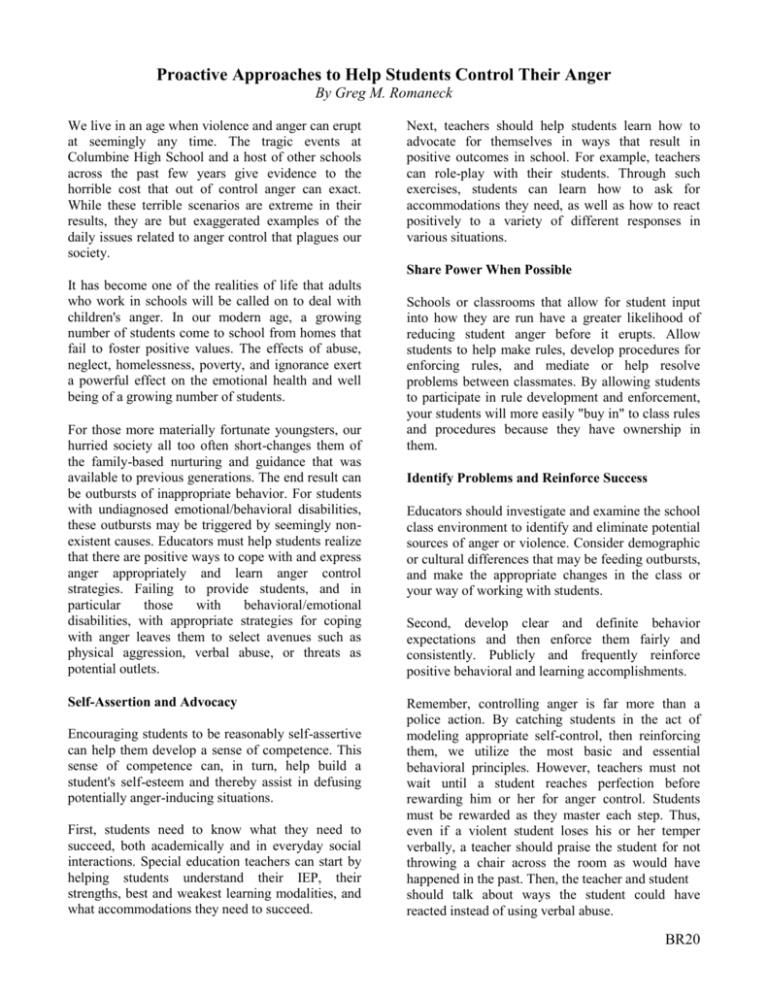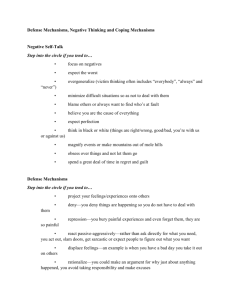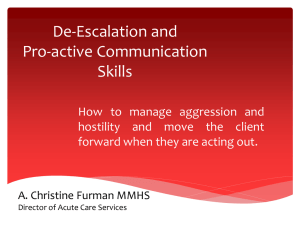BR20 Proactive Approaches to Help Students Control Their Anger
advertisement

Proactive Approaches to Help Students Control Their Anger By Greg M. Romaneck We live in an age when violence and anger can erupt at seemingly any time. The tragic events at Columbine High School and a host of other schools across the past few years give evidence to the horrible cost that out of control anger can exact. While these terrible scenarios are extreme in their results, they are but exaggerated examples of the daily issues related to anger control that plagues our society. Next, teachers should help students learn how to advocate for themselves in ways that result in positive outcomes in school. For example, teachers can role-play with their students. Through such exercises, students can learn how to ask for accommodations they need, as well as how to react positively to a variety of different responses in various situations. Share Power When Possible It has become one of the realities of life that adults who work in schools will be called on to deal with children's anger. In our modern age, a growing number of students come to school from homes that fail to foster positive values. The effects of abuse, neglect, homelessness, poverty, and ignorance exert a powerful effect on the emotional health and well being of a growing number of students. For those more materially fortunate youngsters, our hurried society all too often short-changes them of the family-based nurturing and guidance that was available to previous generations. The end result can be outbursts of inappropriate behavior. For students with undiagnosed emotional/behavioral disabilities, these outbursts may be triggered by seemingly nonexistent causes. Educators must help students realize that there are positive ways to cope with and express anger appropriately and learn anger control strategies. Failing to provide students, and in particular those with behavioral/emotional disabilities, with appropriate strategies for coping with anger leaves them to select avenues such as physical aggression, verbal abuse, or threats as potential outlets. Self-Assertion and Advocacy Encouraging students to be reasonably self-assertive can help them develop a sense of competence. This sense of competence can, in turn, help build a student's self-esteem and thereby assist in defusing potentially anger-inducing situations. First, students need to know what they need to succeed, both academically and in everyday social interactions. Special education teachers can start by helping students understand their IEP, their strengths, best and weakest learning modalities, and what accommodations they need to succeed. Schools or classrooms that allow for student input into how they are run have a greater likelihood of reducing student anger before it erupts. Allow students to help make rules, develop procedures for enforcing rules, and mediate or help resolve problems between classmates. By allowing students to participate in rule development and enforcement, your students will more easily "buy in" to class rules and procedures because they have ownership in them. Identify Problems and Reinforce Success Educators should investigate and examine the school class environment to identify and eliminate potential sources of anger or violence. Consider demographic or cultural differences that may be feeding outbursts, and make the appropriate changes in the class or your way of working with students. Second, develop clear and definite behavior expectations and then enforce them fairly and consistently. Publicly and frequently reinforce positive behavioral and learning accomplishments. Remember, controlling anger is far more than a police action. By catching students in the act of modeling appropriate self-control, then reinforcing them, we utilize the most basic and essential behavioral principles. However, teachers must not wait until a student reaches perfection before rewarding him or her for anger control. Students must be rewarded as they master each step. Thus, even if a violent student loses his or her temper verbally, a teacher should praise the student for not throwing a chair across the room as would have happened in the past. Then, the teacher and student should talk about ways the student could have reacted instead of using verbal abuse. BR20 Use Effective Listening Skills Take the time to talk to students about their problems and attitudes toward a negative situation. Listening to your students can help them develop a sense of personal efficacy, responsibility, and worth, in a caring but structured environment. Model sincere compassion and concern for your students despite what they have done. Demonstrating that certain actions cannot be tolerated and have consequences but that these results do not include personal rejection of the student involved can be effective. essential to utilize learning strategies that emphasize cooperation, sharing, peer support, and compassion enhancement. By stressing collaboration and cooperation, educators create an atmosphere in which their students can practice pro-social skills. It is also important to stress connection to a family system and a cooperative atmosphere in school. Unless some form of partnership with a student's family is developed, the gains they may achieve in school are unlikely to carry over to other environments. Reach out to parents and establish at least a minimum level of cooperation if possible. Teach Problem-Solving Strategies Provide Opportunities for Movement, Breaks, and Motor Outlets Many students with anger control issues have a hard time sitting still in the classrooms. Therefore, build movement breaks or gross motor outlets into the school or class schedule. Occupational therapists have found an increasing need for movement breaks for students with autism and/or sensory defensiveness. Therefore, the absence of such movement opportunities can result in aggressive or acting out behaviors due to sensory overload or a buildup of emotional and physical energy. What ever your students' ages, include some specific curricular approach to problem solving. Through a developmentally appropriate approach to teaching problem-solving skills, we provide students with the raw materials and tools necessary to control their actions. Teaching students the steps to problemsolving: identifying the problem, brainstorming the solutions, determining the best solution given the information he or she has, implementing the solution, and evaluating the solution-and practicing it in non-threatening situations-gives students the strategies they can use when conflict situations occur. Provide Positive Alternatives Since anger is a reality for us all, it is important to realize that students will lose their tempers over things that are both understandable and mysterious. Therefore, teach your students strategies that will limit, control, or divert angry impulses. Skills such as relaxation responses breathe counting, appropriate venting techniques, ignoring, or providing corrective feedback are skills that can be learned. Also, work with your students at their own developmental level to identify, teach, model, evaluate, and practice specific socially acceptable approaches to coping with anger. Emphasize Cooperative Ventures Establish cooperative goal structures in classrooms, schools, and homes by stressing collaboration and concern. If you wish to help create an atmosphere wherein students are better able to cope with anger, it is An effective teacher would never consider testing students on curriculum not yet taught. In the same manner, it is unreasonable to expect students with anger control issues to be able to demonstrate growth unless they have received specific instruction. By taking a pro-active approach to anger control, educators can help their students become more effective in school, in their relationships with their families, and in their interaction with the community. If at least one student deals appropriately with his or her anger instead of delving into extremes of violence because we reflected upon the issues of anger and concomitant violence that plague our schools, then that is time well spent. Permission to reprint has been granted to the Parent Information Network, Arizona Department of Education, Exceptional Student Services, by the Council for Exceptional Children, 1110 North Glebe Road, Suite 300, Arlington, VA 22201-5704, 1-888-CEC-SPED. Originally printed in CEC Today, February 2001. BR20








